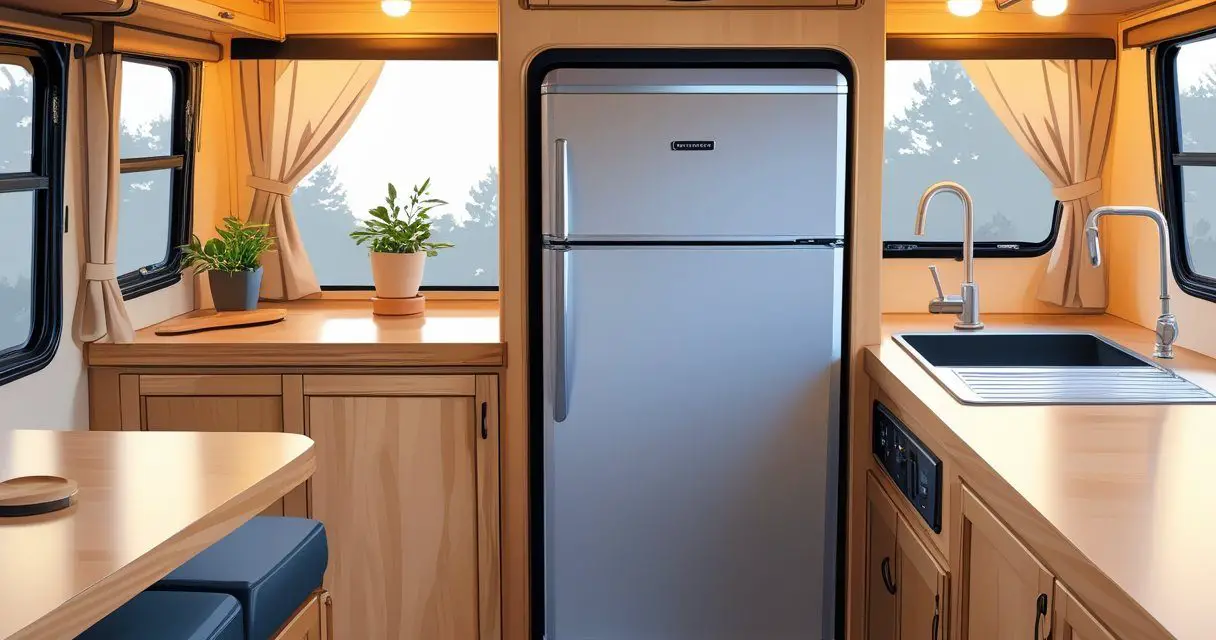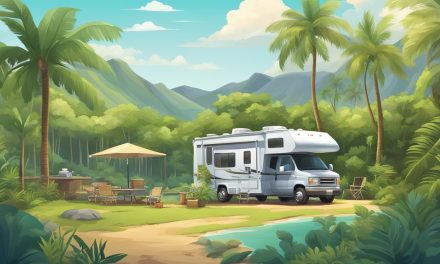The Complete Guide: Can RV Fridge Run While Driving? Everything You Need to Know in 2025
Wondering if you can keep your RV refrigerator running during those long road trips? You’re not alone! This is one of the most common questions new RVers ask. The good news is – yes, most RV fridges CAN run while driving, but the details depend on what type of fridge you have and how you power it.
Let’s break this down in simple terms so you can keep your food cold and fresh on every adventure.
Quick Answer: Yes, But It Depends on Your Fridge Type
The short answer is YES – but it depends on what kind of RV fridge you have:
- 3-Way Fridges: Can run on battery power while driving ✅
- 12V Compressor Fridges: Work great while driving ✅
- 2-Way Fridges: Need special setup (inverter) while driving ⚠️
- Residential Fridges: Need inverter system while driving ⚠️
Understanding Different Types of RV Fridges
Before we talk about driving, let’s understand what type of fridge you have. This makes ALL the difference!
Watch this expert explanation of how different RV fridges work:
Would you like to save this article?
1. Three-Way (3-Way) Fridges – The Most Common
These are the most popular fridges in RVs. They’re called “3-way” because they can run on three different power sources:
- Shore Power (120V AC) – when plugged into campground
- Propane Gas – when boondocking
- 12V DC Battery – perfect for driving!
✅ Driving Verdict: These work GREAT while driving on battery power.
2. Two-Way (2-Way) Fridges – Newer RVs
Found in many newer, larger RVs. They only run on:
- Shore Power (120V AC)
- Propane Gas
⚠️ Driving Verdict: Need an inverter to run while driving (converts 12V to 120V).
3. 12V Compressor Fridges – The Efficient Choice
These modern fridges are super efficient and run directly on:
- 12V DC Battery Power
- Shore Power (with adapter)
✅ Driving Verdict: Perfect for driving! Very energy efficient.
4. Residential Fridges – Just Like Home
Regular household fridges installed in RVs. They only run on:
- 120V AC Power
⚠️ Driving Verdict: Must have inverter system to run while driving.
Learn more about using inverters for residential fridges:
https://www.youtube.com/watch?v=HGyhiIYvSXA
Power Sources While Driving: Your Options
Option 1: Battery Power (12V DC) – Most Common
How it works: Your vehicle’s alternator charges your RV batteries while driving, powering your fridge.
Best for:
- 3-way fridges
- 12V compressor fridges
Power consumption:
- 3-way fridges: 180-275 watts (15-20 amps)
- 12V compressor: 50-180 watts (4-15 amps)
- 12V portable: 8-30 watts (0.7-2.3 amps)
Option 2: Inverter System (12V to 120V AC)
How it works: Inverter converts 12V battery power to 120V AC power for your fridge.
Best for:
- 2-way fridges
- Residential fridges
Important: Requires larger battery bank and powerful alternator.
Expert advice on using inverters while driving:
Option 3: Propane Gas – Controversial
The debate: While technically possible, many experts recommend against running propane while driving.
Safety concerns:
- Fire risk in accidents
- Gas leaks while driving
- Some tunnels prohibit propane
Legal status: Not illegal in most states, but has restrictions.
Battery Calculations Made Simple
Let’s do some easy math to see if your battery can handle your fridge:
Basic Formula:
Runtime = Battery Capacity ÷ Fridge Power Draw
Example Calculation:
- You have: 100Ah battery
- Your 12V compressor fridge uses: 5 amps per hour
- Runtime: 100Ah ÷ 5A = 20 hours
But wait! Only use 50% of lead-acid batteries (80% for lithium), so:
- Lead-acid: 10 hours actual runtime
- Lithium: 16 hours actual runtime
Real-World Power Usage:
| Fridge Type | Power Draw | Daily Use | 100Ah Battery Runtime |
|---|---|---|---|
| 3-Way (12V mode) | 15-20 amps | Very high | 2-3 hours |
| 12V Compressor | 4-8 amps | Moderate | 6-12 hours |
| 12V Portable | 1-3 amps | Very low | 16-50 hours |
Learn how to calculate your RV’s power needs:
https://www.youtube.com/watch?v=zTi_NQzUZvc
Safety First: Propane While Driving
This is where things get controversial. Here’s what you need to know:
The Safety Concerns
Fire Risk:
- Propane is highly flammable
- Accident could cause explosion
- Road vibrations might loosen connections
Legal Restrictions:
- Some tunnels require propane OFF
- Ferry systems have rules
- Gas stations require propane OFF
Watch this expert analysis on propane safety while driving:
Expert Recommendations
Most RV safety experts say:
❌ Don’t run propane while driving – too risky
✅ Use battery power instead – much safer
✅ Cool fridge beforehand – then turn off propane
More insights on propane safety:
If You Must Use Propane:
- Check all connections before driving
- Turn OFF at gas stations
- Turn OFF in tunnels
- Have working propane detector
- Know your state’s laws
Learn about propane safety best practices:
How to Keep Your Fridge Cold While Driving
Method 1: Pre-Cool Strategy (Recommended)
Step 1: Cool fridge to 32°F before leaving
Step 2: Switch to battery power while driving
Step 3: Load pre-chilled food and drinks
Step 4: Keep door closed during travel
Result: Food stays cold for 4-8 hours depending on outside temperature.
See how long RV fridges stay cold without power:
Real-world test of fridge performance while traveling:
Method 2: Battery Power (Best Option)
For 3-Way Fridges:
- Switch to 12V DC mode before leaving
- Your alternator keeps battery charged
- Fridge runs continuously
For 12V Compressor Fridges:
- Already runs on 12V
- Very efficient power use
- No switching needed
Learn about running fridges on battery power:
Method 3: Inverter Setup (Advanced)
What you need:
- Pure sine wave inverter (1000W+)
- Large battery bank (400Ah+)
- High-output alternator
- Proper wiring
Best for: Residential fridges or when you need 120V power.
Extending Battery Life While Driving
Charging Your Batteries
Your vehicle’s alternator charges batteries while driving, but:
- Stock alternators: May not keep up with high-draw fridges
- Upgraded alternators: Better for power-hungry setups
- DC-to-DC chargers: Most efficient charging method
Additional Power Sources
Solar Panels:
- Help supplement battery charging
- Work even while driving
- Best on sunny days
Portable Generators:
- Backup power option
- Can’t run while driving
- Good for extended stops
Troubleshooting Common Problems
Problem: Fridge Not Staying Cold
Possible causes:
- Battery voltage too low
- Fridge not level (for absorption types)
- Door seals damaged
- Overcrowded fridge
Solutions:
- Charge batteries fully before trip
- Check fridge level when parked
- Replace damaged seals
- Organize fridge contents
Expert troubleshooting tips:
Problem: Battery Draining Fast
Possible causes:
- Fridge drawing too much power
- Old batteries losing capacity
- Poor alternator charging
- Other devices using power
Solutions:
- Upgrade to lithium batteries
- Install DC-to-DC charger
- Turn off unnecessary devices
- Monitor power usage
Understanding Propane Requirements
Even if you plan to run on battery, your RV fridge still needs a small amount of battery power for propane operation:
Watch this explanation of why RV fridges need batteries for propane:
State Laws and Regulations
Propane Laws by Region
Good news: No states completely ban propane while driving.
Common restrictions:
- Tunnels: Many require propane OFF
- Ferries: Usually require propane OFF
- Gas stations: Always turn propane OFF
- Bridges: Some have restrictions
Safety Requirements
- Working propane detectors
- Proper tank mounting
- Regular system inspections
- Emergency shutoff accessible
Professional RV Maintenance Tips
Learn from the experts about RV refrigerator maintenance:
Understanding how RV refrigerators work:
Comparing different RV fridge types:
Recommended Products and Upgrades
Best 12V Compressor Fridges
For efficiency while driving:
- Dometic CFX series
- ARB Classic series
- ICECO portable fridges
- BougeRV 12V fridges
Battery Upgrades
Lithium batteries (recommended):
- 80% usable capacity
- Faster charging
- Longer lifespan
- Lighter weight
Lead-acid alternatives:
- AGM batteries
- Gel batteries
- More affordable option
Charging Solutions
DC-to-DC chargers:
- Victron Orion series
- Renogy DC-DC chargers
- Sterling Power chargers
Expert Tips for Success
Before You Drive
✅ Pre-cool fridge to 32°F
✅ Check battery voltage (12.6V+ for full charge)
✅ Switch to 12V mode (3-way fridges)
✅ Load cold items first
✅ Turn OFF propane for safety
While Driving
✅ Keep fridge door closed
✅ Monitor battery voltage if possible
✅ Drive with confidence – your food will stay cold!
When You Arrive
✅ Check fridge temperature
✅ Switch back to propane or shore power
✅ Let batteries fully recharge
Learn proper RV fridge operation settings:
https://www.youtube.com/watch?v=Wm2_Molr35c
Advanced Setup Tips
For those wanting to run AC fridges while driving:
Professional troubleshooting for propane and electrical issues:
Frequently Asked Questions
Q: How long will my fridge stay cold while driving?
A: With a properly pre-cooled fridge and good insulation, 4-8 hours is typical. 12V compressor fridges can run indefinitely while driving if your alternator keeps up.
Q: Will running my fridge drain my truck’s battery?
A: No, if properly wired. Your alternator should easily handle the extra load while driving. The RV house batteries power the fridge, not your truck’s starting battery.
Q: Is it safe to drive with propane on?
A: While legal in most places, safety experts recommend against it. Battery power is safer and just as effective.
Q: Do I need to upgrade my alternator?
A: For most 12V compressor fridges, no. For power-hungry setups or residential fridges with inverters, consider upgrading.
Q: Can I run my fridge on solar while driving?
A: Solar panels help but usually can’t power a fridge alone while driving. They supplement your alternator charging.
The Bottom Line
Yes, you CAN run your RV fridge while driving – and you should! Here’s the safest, most effective approach:
🏆 Best Method: Use 12V battery power
🏆 Best Fridge Type: 12V compressor or 3-way fridge
🏆 Best Practice: Pre-cool, then switch to battery power
🏆 Best Safety: Avoid propane while driving
With the right setup and knowledge, you’ll never worry about warm food or spoiled groceries on your RV adventures again!
Sources:
BougeRV – Will an RV Fridge Run Off Battery While Driving
Renogy – Can I Run my RV Fridge on Battery While Driving
Colton RV – How RV Refrigerators Operate
StressLess Camping – Should I drive with my RV refrigerator on
The RV Geeks – Will an RV Fridge Run Off Battery While Driving







